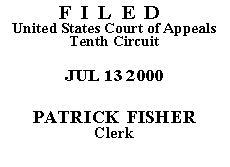

| ALAN DAVID SWENDRA,
Petitioner-Appellant, v. RICK SOARES; ATTORNEY GENERAL OF THE STATE OF COLORADO, Respondent-Appellee. |
|
Petitioner seeks review of an order of the district court dismissing as untimely his habeas corpus petition filed pursuant to 28 U.S.C. § 2254. We have jurisdiction pursuant to 28 U.S.C. § 1291. Leave to proceed in forma pauperis is granted. Because petitioner has failed to make a substantial showing of the denial of a constitutional right, see 28 U.S.C. § 2253(c)(2), we deny his request for certificate of appealability and dismiss the appeal.
The issue before us is whether the habeas petition filed in district court on November 25, 1998, was timely in view of the requirement of 28 U.S.C. § 2244(d)(1)(A) that the petition be filed within one year of the date the state court judgment "became final by the conclusion of direct review or the expiration of the time for seeking such review," as extended by the time during which a properly filed state post-conviction action is pending. See id. § 2244(d)(2); Hoggro v. Boone, 150 F.3d 1223, 1226 (10th Cir. 1998).
Petitioner's criminal conviction became final in 1993 following the completion of direct appeal proceedings in state court. He filed an application for post-conviction relief under Colo. R. Crim. P. 35(c) in January of 1994. For a variety of reasons not relevant to our disposition, this motion remained pending for quite some time and spawned a premature habeas action filed in federal court. See Swendra v. Beida, No. 97-1368, 1998 WL 199656, at **1 (10th Cir. Apr. 24, 1998) (dismissing petition for failure to exhaust state court remedies) (Swendra I).
On April 24, 1997, the state trial court held a hearing on petitioner's post-conviction motion. Petitioner, who was proceeding pro se but with advisory counsel, tendered to the court a "Motion for Court to Determine Proper Jurisdiction, Bounding State Court Proceedings Pursuant to Crim. P. Rule 35(c)(2)(3) to the Federal Court."(1) The state court denied the motion and offered to set the Rule 35(c) motion for a hearing, which petitioner refused. The court determined it lacked jurisdiction to bind the matter over to federal court and further found that petitioner had waived his right to further pursue his state post-conviction remedy. Although petitioner objected, he would not commit to either withdrawing the motion or pursuing it by setting the matter for hearing. By minute order, the court then closed the case. Appellee's Brief, App., at 1.
Under Colorado Appellate Rule 4(b)(1), petitioner had forty-five days in which to appeal the state court's order. Instead, he filed a "Motion for Free Transcript and Written Order of April 24, 1997, Ruling." R. Doc. 6, App. A, which the state court granted by form order entered May 15, 1997. R. Doc. 6, App. B. According to petitioner, the court sent him the transcript but did not send a written order. Petitioner did not appeal the April 24 order to the Colorado Court of Appeals.(2) He also did not file a request for an extension of time in which to appeal.(3)
In dismissing this action, the district court determined that the state post-conviction motion was no longer pending after April 24, 1997, the point at which "'Swendra's post-conviction motion in Arapahoe County had been denied and the case closed.'" R. Doc. 9 at 6 (quoting Swendra I, 1998 WL 199656, at **1). The federal habeas petition was filed approximately nineteen months later, well beyond the one-year limitation period of § 2244(d).
Petitioner was present at the state court hearing on April 24, 1997, when he was advised he had waived his right to further pursue state post-conviction relief by adamantly refusing to go forward with a hearing. He had forty-five days to appeal that decision in order to continue the tolling provision of § 2244(d)(2). Having elected not to further pursue state appellate remedies, he was subject to the limitations period of § 2244(d)(1)(A).
We therefore conclude the district court correctly dismissed the petition as time-barred. Accordingly, the certificate of appealability is DENIED, and the appeal is DISMISSED.
Entered for the Court
Circuit Judge
*. This order and judgment is not binding precedent, except under the doctrines of law of the case, res judicata, and collateral estoppel. The court generally disfavors the citation of orders and judgments; nevertheless, an order and judgment may be cited under the terms and conditions of 10th Cir. R. 36.3.
1. Although this motion is not in the record before us, we understand it was an attempt to "transfer" the state post-conviction proceedings to federal court (where his federal habeas petition was then pending) because of the state court's delay in deciding the matter.
2. Under Colorado Appellate Rule 3(g)(7) it appears that a copy of the minute order would have sufficed as "a copy of the judgment or order being appealed."
3. Under Colorado Appellate Rule 4(b)(1), the appellate court can, on a showing of excusable neglect, extend the time to file a notice of appeal for thirty days with or without motion and notice and before or after the time for appealing has expired.